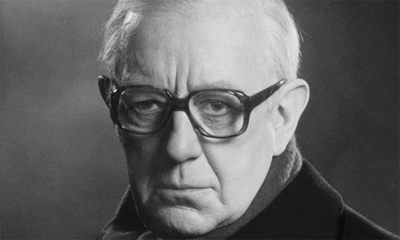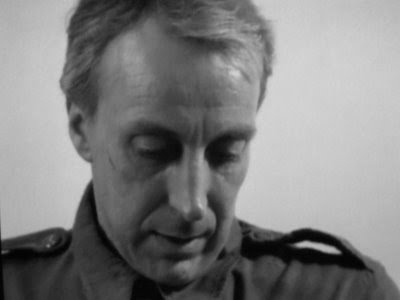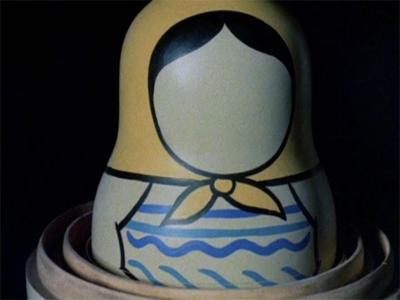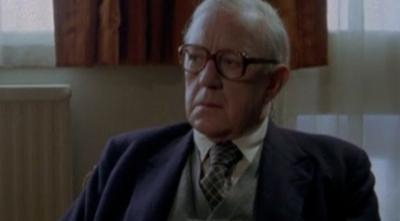Let’s not be melodramatic. Control would disapprove.
– Smiley sums it up
It’s odd coming to the BBC’s 1979 adaptation of Tinker, Tailor, Soldier, Spy in the opposite direction of most fans. I’ve never read la Carre’s original novel, and I saw Tomas Alfredson’s movie before watching the miniseries. So my perspective is slightly askew, as if I’m moving in the wrong direction. My viewing of the miniseries is informed more by the 2011 movie than by the book that inspired it. Still, it’s very hard not to be impressed by the television adaptation, which really seems like it pulled out all the stops in translating the story from page to screen, featuring an all-star cast, of which Sir Alec Guinness is only the front man.
Spread over six one-hour episodes, the series is obviously a very different beast from the movie. There are strengths and weaknesses to either approach, with the movie feeling considerably tighter and tenser, while the miniseries feels somewhat more stately with extra room afforded for characterisation. What’s strange is that the plot content is about the same, with the film covering the same ground in much less time, with a minimum of material cut – the only major character that seems to be missing from the film completely is Jerry Westerby, played by Joss Ackland here. The only major difference in term of plotting is that the miniseries expands the conclusion of the tale quite significantly, which we’ll come to in a bit.
So, while covering the same plot beats here, most of the extra space goes to character development, and I think that it’s space well used. Sir Alec Guinness tends to get discussed quite a bit when talking about the show, but it also features impressive supporting turns from Michael Jayston, Ian Richardson, Ian Bannen and Hywel Bennett, among others. Even the actors making relatively minor appearances, like Joss Ackland and Patrick Stewart, leave a pleasant impression.
We get a much greater sense of who the players are in the game, with material that couldn’t possibly have been wedged into the film. In particular, Roy Bland gets a fair amount of characterisation, and we get a sense of the bitter disillusionment that both he and Bill Hayden are feeling at the state of British Intelligence. There are other nice touches, like a bit more information about Ricky Tarr and his family, and they do add up over the course of the miniseries to make quite a significant impact. The film pretty thoroughly demonstrated how severely dysfunctional the Circus had become, but it’s really expanded on here.
In fact, the miniseries does elaborate quite well on several points – the extra running time affords the miniseries a chance to delve a bit deep into certain aspects, like the institutionalisation that people like Smiley must feel on entering the world. You could argue that the film dealt with such things in an economic manner, with Smiley shopping for glasses and going for a morning swim, but the miniseries uses the space to really wallow in it. Recalling her debriefing on spotting a Russian double agent, which she was promptly told to forget, one officer recalls being told, “You’re losing your sense of proportion, Connie. It’s time you got out into the real world.” It sounds like a threat, and it was undoubtedly meant as such.
That said, there are scenes and lines that are lifted directly from the miniseries (and, presumably, the book as well). In many cases, it seems like Alfredson was merely writing the abridged version. However, what the miniseries has in development and space, it does lack in tension and direction. In particular, Peter Guillam’s trip to the archives seems almost relaxed here, rather than the incredibly tense experience it appeared on the big screen. While the reveal of what Smiley’s wife had been getting up to wasn’t exactly subtle or nuanced in film, it’s just casually thrown out in the miniseries. While the miniseries feels impressive and stately, that occasionally means that it misses an opportunity here or there for a solid scene.
It’s interesting to discuss Sir Alec Guinness, who was a really big deal for a BBC television production. He is as solid as one might expect, and he does great work with his material. There’s even a great scene where Smiley lays out his theory to a “guest”– Guinness is so good that he even impresses delivering exposition. It’s a fantastic lead performance. It’s interesting, however, that so many people are commenting on the similarities between Guiness’ performance and that of Gary Oldman, I actually found the differences far more pronounced.
While neither was especially extroverted, Guinness seemed to wedge Smiley’s tough outer shell open from time to time, creating the impression of a man who was trying really hard to keep it all bottled up. There are moments when you see emotions that must be genuine flashing (briefly) across Smiley’s face. In contrast, Oldman’s character is much more internalised and focused inward, only really coming out of his shell once in the entire film. I think both work within the context of the work – we spend more time with Guinness’ Smiley, so we see more of him; while Oldman’s Smiley works more as a comment on the British character.
The other major difference is the ending. Alfredson tackled the central theme of the story throughout his work, hinting at the decline and decay of Great Britain, to the point where it was ultimately trivialised in the ideological conflict between the United States and Soviet Russia – this theme was peppered throughout the movie, and tied together in the end, where we were really denied an explicit motivation for the traitor, beyond a rather bland, “the West is so very ugly.” Here, the decline of the great British character is used as the mole’s motivation, bitter at the fact that the once powerful empire has been reduced to “America’s street-walker”, regretting “how trivial we’ve become as a nation.”
In fact, the ending does benefit from having more room to play itself out. We get some nice moments with Guillam after the reveal, as he considers how many men he lost. We also get some interesting conversations with Smiley, where we get a much greater idea of why and how something like this happened. A lot of it you could probably have intuited from the film, but it is nice to have it explicitly stated, especially when you’re watching two very skilled actors at work.
The miniseries does look remarkable for a television production in the late seventies, managing to rise to the challenges of a book set across the international scene. Part of me wonders what was in The Honourable Schoolboy that made it so cost prohibitive to adapt for the small screen, but at least we got the third part of la Carre’s trilogy, Smiley’s People, which I am looking forward to digging into when the opportunity provides itself. It’ll be fascinating to examine the sequence miniseries without any frame of reference to measure it against, to be able to truly judge it on its own terms.
I’m inevitably going to be asked which version of the story I preferred. Truth be told, they both offered different things. Both have casts worth watching for, while Tomas Alfredson gives his adaptation an energy that is sorely missing here. On the other hand, the extra space here affords the characters room to breath and maneuver – although I’d be very quick to point out that the film rather efficiently covers the same ground in less time. Both are superb accomplishments and, truth be told, I would recommend both – it comes down to a matter of personal preference you want to digest the story in. You can’t beat the movie’s mood and atmosphere, but the miniseries has a more stately grace.
Filed under: Television | Tagged: Alec Guinness, bbc, gary oldman, George Smiley, John le Carré, Joss Ackland, Peter Guillam, review, Smiley, Television, Tinker Tailor Soldier Spy, Tomas Alfredson |
























According to wikipedia, shooting in HK (and somewhere that could substitute for Vietnam/Laos — unlike the first and third books, this book also has its share of pyrotechnics) was prohibitingly expensive for the BBC. While they’ve shifted the whole Ricky Tarr segment to Portugal instead of HK, I don’t think it could’ve been pulled-off effectively in the 2nd book.